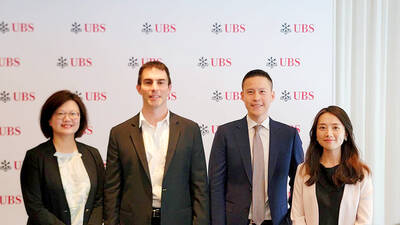HTC Corp (宏達電) yesterday confirmed that it was delaying shipments of its newest smartphone model to several countries, but did not explain the reason for the delay.
“We will start fulfilling pre-orders by the end of March in certain markets and will roll out to more markets as we approach April,” HTC said in an e-mail.
KGI Securities Co (凱基證券) said in a research note on March 6 that the company was facing production bottlenecks because of a shortage of voice coil motors and compact camera modules for its newest HTC One model due to low yields.
HTC’s statement came after British phone retailer Clove Technology notified its customers on Tuesday of a delay of the HTC One’s launch in the UK.
The original launch date was set for tomorrow, but Clove was told by HTC that the phone would now go on sale on March 29, the retailer said in a blog post.
Unveiled on Feb. 19 in London and New York, the HTC One has a 4.7-inch display with full-HD resolution of 1,920x1,080 pixels, a 1.7-gigahertz quad-core processor and a new “UltraPixel” camera that enables ultrasharp photo shooting and video recording.
KGI Securities slashed its shipment forecast for the HTC One in the first half of the year by as much as 80 percent because of the shortage of critical components.
In its revised projections, KGI expected HTC to ship 10.5 million smartphones in the first half of this year, far below its previous forecast of 14 million to 15 million units.

TECH TITAN: Pandemic-era demand for semiconductors turbocharged the nation’s GDP per capita to surpass South Korea’s, but it still remains half that of Singapore Taiwan is set to surpass South Korea this year in terms of wealth for the first time in more than two decades, marking a shift in Asia’s economic ranks made possible by the ascent of Taiwan Semiconductor Manufacturing Co (TSMC, 台積電). According to the latest forecasts released on Thursday by the central bank, Taiwan’s GDP is expected to expand 4.55 percent this year, a further upward revision from the 4.45 percent estimate made by the statistics bureau last month. The growth trajectory puts Taiwan on track to exceed South Korea’s GDP per capita — a key measure of living standards — a

Samsung Electronics Co shares jumped 4.47 percent yesterday after reports it has won approval from Nvidia Corp for the use of advanced high-bandwidth memory (HBM) chips, which marks a breakthrough for the South Korean technology leader. The stock closed at 83,500 won in Seoul, the highest since July 31 last year. Yesterday’s gain comes after local media, including the Korea Economic Daily, reported that Samsung’s 12-layer HBM3E product recently passed Nvidia’s qualification tests. That clears the components for use in the artificial intelligence (AI) accelerators essential to the training of AI models from ChatGPT to DeepSeek (深度求索), and finally allows Samsung

READY TO HELP: Should TSMC require assistance, the government would fully cooperate in helping to speed up the establishment of the Chiayi plant, an official said Taiwan Semiconductor Manufacturing Co (TSMC, 台積電) yesterday said its investment plans in Taiwan are “unchanged” amid speculation that the chipmaker might have suspended construction work on its second chip packaging plant in Chiayi County and plans to move equipment arranged for the plant to the US. The Chinese-language Economic Daily News reported earlier yesterday that TSMC had halted the construction of the chip packaging plant, which was scheduled to be completed next year and begin mass production in 2028. TSMC did not directly address whether construction of the plant had halted, but said its investment plans in Taiwan remain “unchanged.” The chipmaker started

LOOKING BRIGHT: Taiwanese tech stocks have been trading at 18 to 19 times earnings, beating the 15 percent long-term average amid AI-driven optimism, an analyst said Taiwan’s economy could expand by as much as 5 percent this year, fueled by its technology manufacturing edge amid a global artificial intelligence (AI) boom, while tariff exemptions on semiconductor products keep the country’s levy burden low despite a headline rate of 20 percent, UBS Investment Bank said yesterday. “Although Washington has imposed a 20 percent tariff on goods from Taiwan, exemptions for semiconductors keep the weighted average low,” UBS senior economist for Asia and China William Deng (鄧維慎) said. The growth momentum is expected to extend into next year, with technology companies’ revenue projected to rise 17 percent, UBS research head